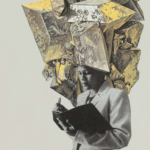
Be Your Own Library Advocate: Book Censorship News, January 19, 2024
This is the third in a series of posts that will offer insights and calls to action based on the results of three recent surveys conducted by Book Riot and the EveryLibrary Institute. The surveys explored parental perceptions of public libraries, parental perceptions of librarians, and parental perceptions of school libraries. You can read part one on how data overwhelmingly supports libraries and part two about how what’s happening in school libraries foreshadows the future of public libraries.
Every year, several posts about what role the public library should have gone viral on social media. The latest came just two weeks into 2024. This time, in addition to libraries needing to take up the role of social workers, warming centers, cooling centers, and make-shift shelters, among other duties inherited through the defunding of other public institutions better fit for these needs, libraries were suggested as a place for indoor play centers so that children during the winter have somewhere to go. It’d be free and save parents so much time, energy, money, and frustration.
The response from library workers and advocates was swift. Just like when someone said libraries should operate with hours like a bar — with plenty of night hours to accommodate working people and young people who want to socialize outside of, say, an actual bar — the person who made the suggestion quickly learned about all of the things libraries already do and why the public library is not the facility for an indoor play place. Yes, some libraries do have expansive and impressive children’s areas with such play equipment. Most, however, do not, and it’s for a host of good reasons.
Social media has made it much easier for those both inside and outside the world of the library to pontificate about libraries. This includes their purpose, their goals, whether they’re being well-used or have died off in the age of instant access to Google, and more. Many times, real systemic issues — such as the lack of affordable options for child entertainment in a society that is openly hostile toward kids and parents — are at the heart. The problem is that libraries are not a catchall, nor can they be. They have a purpose, and it’s one that needs to continue being championed.
Libraries need more champions, but those champions cannot solely come from outside the facility. Promoting upcoming programs and new collection materials is not enough anymore, nor has it ever been. Full-grown, tax-paying adults do not understand what libraries do, why they exist, or the value these institutions have on our democracy.
Libraries are not and never have been neutral. Libraries cannot be neutral. By virtue of being funded by the people and upholding the constitution and specifically the First and Fourteenth Amendment Rights of all, neutrality is impossible. What has been parroted as an unfortunate talking point for decades is a misapplication of a court decision going back to at least Kreimer vs. Morristown. In that case, the courts ruled that libraries, as a limited public forum, can implement viewpoint-neutral rules. “Neutral” stuck. But what it means in practice is that libraries have the right to implement policies that do not discriminate, which is not the same as neutrality.
What libraries are, though, is nonpartisan. This simply means libraries do not serve one political viewpoint exclusively, nor do they advocate on behalf of any political affiliation as an institution. Library workers can maintain partisanship, as they are private citizens, but the library-with-a-capital-L does not choose a single political side with which to align. Libraries are not neutral but strive to operate under as little bias as possible. This is why the party affiliation of board members, whether elected or appointed, is nonpartisan. But it’s here where contemporary politics have proven that libraries cannot be neutral or nonpolitical. We have seen how party politics have poured money into election campaigns that would put the control of libraries under community politicians, thus ceding to partisanship.
Parents are split on what they think about library workers and politics. A full 35% believe that public librarians have political agendas and that they should. An additional 9% believe that public librarians do not have a political agenda but should. That is 44% of parents stating that public library workers should have a political agenda. On the other side, only 12% believe public librarians have an agenda and should not, while 44% believe public librarians do not have a political agenda and should not have one.
Much as library workers do and should encourage other people to advocate for them, it needs to be part of library work to advocate on your own behalf. This starts with dismantling policies in place that may not have been updated in years, if not decades, that turn to neutrality as a core value or mission. Advocacy and activism are essential to remain institutions that garner public funds.
Yes, library workers can and should engage in activism on behalf of their libraries. All that means is taking specific actions to ensure its survival. That includes everything from voting in local elections to building partnerships with organizations throughout the community. Set up a candidate forum and invite everyone running for school board or state representative to show up, and before and after they speak, reiterate that these sorts of events are made possible and accessible because of the library. As a library worker, ask questions about the library during these sessions. Represent yourself as someone who connects with people across your diverse community every single day and as someone whose concerns include where and how officials plan to keep an institution that vehemently defends the First Amendment vibrant.
Library workers should be at city council meetings, open meetings for various social groups in communities, and write to any and everyone they can about the value of the library. They should be talking with elected officials and with community leaders about the role the library plays and build those connections for mutual benefit.
It’s likely that at this point, library workers might be thinking it impossible to add even more to their lives outside of the work day. But these activities should be part of the work day. This requires a fundamental shift from the top downward, wherein the administration becomes champions of what the library offers and allocates space, time, and resources for employees to engage in this kind of work. Perhaps it’s a standing committee given a few hours a month. Perhaps it’s time built into every employee’s schedule during the week. Perhaps it’s setting a series of goals as a team to achieve in the next quarter, half year, year, two years and encouraging each other to meet or beat them. It might also involve planning coverage so that workers can attend local political hearings or state legislative days and get the name of the library into the ears of politicians. If your library has a union, get involved; if not, this is the time to consider seeing what your options are for representation.
Encourage those who can to run for library or school boards and to get engaged with Friends or Foundation groups (those who work in your library may not be eligible to represent on your board, but they may live in a different community and be an incredible asset there). And don’t just encourage: actively seek out training and educational opportunities tailored to people who work in the library to help people see where and how they can make a difference. Soft skills are a weakness in the library world, but the capacity to develop them and learn from colleagues and advocates is there. One example: Get Ready, Stay Ready.
Grant permission to library workers to become the activists and advocates of the very systems they’re a part of. This skill-building is crucial and aligned with the institution and all it stands for. For too long, we’ve depended on others to do this on behalf of the libraries. Unfortunately, it’s not only not working, but it’s far from enough.
Public libraries are not play places. They are not cooling centers or warming centers or mental health clinics. Public libraries are not bars, nor are they essential services. Public libraries are places of information and access to information. They are places that ardently defend the rights of every person to seek out that information. This is fundamental and yet not highlighted or underlined enough. Public libraries are cornerstones of democratic and civic engagement, not safety nets for broken systems elsewhere. They might take on those roles, but that’s not their purpose.
No one else can raise your social value for you. You have to do it yourself. You have the data here to support it.
Book Censorship News: January 19, 2024
Before diving in, a call to action. If you are anywhere in or near Annandale, New Jersey, or the North Hunterdon-Voordees School District in New Jersey, please show up in support of your district’s librarian and the freedom to read on Tuesday, January 23. Here’s the background, alongside the history of challenges here, and talking points for the board.
- 25 books were banned in Marietta City Schools (GA) this week.
- The Boone County School Board (KY) will keep Endlessly Ever After on elementary school library shelves.
- “A Nampa [ID] lawmaker wants to try again to allow guardians of children to sue for damages if their child is exposed to what Republicans deem ‘harmful material’ in libraries, after an effort to impose a similar law failed last legislative session.” It’s 2024, and Idaho Republicans want parents to be able to sue librarians because they, the parents, haven’t bothered doing their own job.
- An update on the Idaho bill — it’s not a good update.
- South Carolina legislators want to institute book ratings in public school libraries, taking a page from Texas’s draconian Reader ACT.
- Bruce Friedman, who submits book ban requests in Clay County, Florida, schools by the dozens, just submitted a new round. He got my book Body Talk banned, and now, my book (Don’t) Call Me Crazy is being reviewed. The school board will be hosting an open forum on the topic of book bans now since Bruce doesn’t get to be the district librarian (I don’t have faith it’ll change anything, but there it is). I broke this story a long time ago, and Bruce has targeted my books in retaliation.
- In the Blackhawk School District (PA), there appears to be some kind of book challenge. No information about that is accessible, but this little report on the latest school board meeting is interesting. Only 2 people on the review committee actually have to read the book to make a decision. I guess then students don’t need to do their homework or educators don’t need to show up to work, so long as two somewhere do it by that logic?
- Last fall, Yorkville School District (IL) met illegally to ban the book Just Mercy. The state Attorney General has gotten involved, but the school board that made the decision is holding fast to it. The example these folks set for the kids they claim they care about and need to protect.
- Iowa legislators are attempting to appeal the injunction that suspends the implementation of their book banning bill.
- The woman who submitted 160 book challenges at the St. Tammany Parish Public Library (LA) withdrew them all. No, it’s not a change of heart. She’s convinced the new board is going to do the work she wants done.
- There’s an absolute mess in Rolla Public Library (MO) over a puberty book.
- A pair of “patriots” are suing the city of Coronado, California, for not removing books from the public library that they do not like and for not allowing them to host a “Tiny Patriot” storytime for kids.
- Regional School Unit 73 (ME) is fielding a challenge over Rick by Alex Gino.
- Paula Mimnaugh has been a staple at Iredell School Board (NC) meetings for years, performing as a book crisis actor on behalf of Moms For Liberty. I wrote about her in April 2022 — she broke into the school to take photos of “naughty books.” She is now being investigated for reading vulgar passages at board meetings by the police.
- The Danville and West Burlington school districts (IA) plan to follow the state book ban law that the courts have currently halted.
- Billings School District’s book review committee (MT) is recommending a ban on Assassination Classroom because they can’t imagine a work of fiction that “glorifies” teacher killings being on shelves. First, it doesn’t; second, it’s guns that do that, not books.
- This story is paywalled, though we know the talks about potential book bans at Mingus Union High School (AZ) have been “tabled.” Keep an eye on this.
- An update on the above story: they’re working on a policy that would allow anyone to challenge school library books, opening the doors to the nonsense happening elsewhere.
- South Carolina’s Moms For Liberty is creating their own taxpayer-funded charter school. I’ve told you since the beginning this is the goal.
- What’s going on in West Ada, Idaho, schools. Dozens of books are under removal consideration thanks to BookLooks reviews by Moms For Liberty, including many which have already been banned.
- “After six months, numerous discussions, several delays and nearly $14,000 spent on the review process, the [Moore County] Board of Education (NC) has decided to remove four books from district libraries.” The books are Looking for Alaska, Eleanor & Park, Crank, and The Bluest Eye. $14,000!!!!!!
- Keep an eye on West Shore School District (PA). The newly appointed conservative board is looking to fire the school’s lawyer (and yes, it’s tied to LGBTQ+ books).
- Polk County, Florida, schools are seeking volunteers to help review the four books being challenged.
- The Curse of King Tut, a comic, has been banned from Lexington-Richland 5 District Schools (SC).
- This story is paywalled, but Camden County Public Library (MO) is debating whether or not to remove books some claim are “explicit” from the children’s area.
Also In This Story Stream
- Survey: What Happened During Pride Month? Book Censorship News for July 5, 2024
- The First American Union Understood The Necessity of Public Libraries and Education: Book Censorship News for June 28, 2024
- Here Come The Public School Closures: Book Censorship News, June 21, 2024
- States That Have Banned Book Bans: Book Censorship News, June 14, 2024
- How Alabama Library Supporters Took Action and You Can, Too: Book Censorship News, June 7, 2024
- Chilling Editorial Cartoons About Book Banning: Book Censorship News, May 31, 2024
- Here’s Where Library Workers are Prohibited From Their Own Professional Organization: Book Censorship News, May 24, 2024
- What Do Book Challenge Forms Look Like?: Book Censorship News, May 17, 2024
- How To Prepare for Pride Month in Libraries 2024: Book Censorship News, May 10, 2024
- Are Librarians Criminals? These Bills Would Make Them So: Book Censorship News, May 3, 2024










